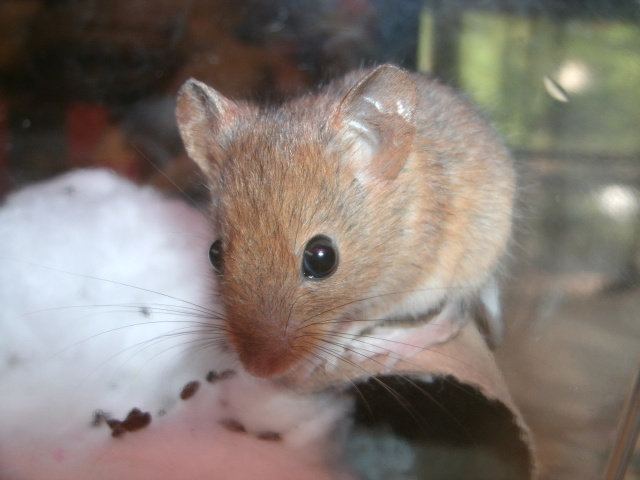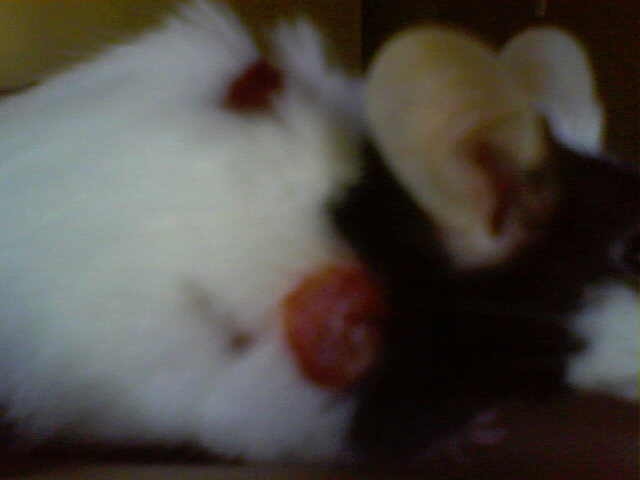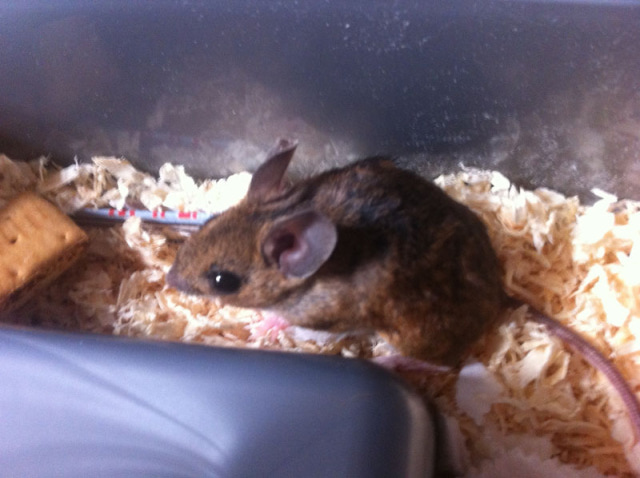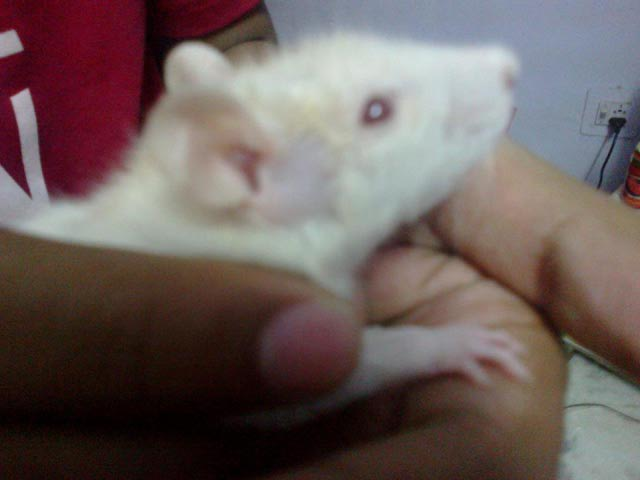QuestionQUESTION: Dear Natasha,
I found a small juvenile mouse, male I think, in the lobby of my apartment
building in New York CIty a few days ago. Rather than put him in the park at
the onset of winter, or discard him in the street, I have rigged up a lidded
aquarium with a hanging water bottle, dish of mouse food from petco,
exercise wheel, soft grey petco bedding, a wodden sleeping hut and some
plastic tubing for exploration. In other words, everything a stray mouse
could want. However, I am concerned that "Stu' is going to get lonely by
himself. Do you recommend that I purchase a petco mouse and add it to the
mix? Should I be concerned that they might not get along, or is in a bad idea
to mix wild and store bought varieties? Or will Stu be okay by himself for
now? Any thoughts or suggestions would be most welcome.
Thanks.
Don (Not the same Don who asked you questions in the past)
ANSWER: Dear Don,
Stu will eat alive any male pet store mouse that you could offer him! Possibly literally. Male mice do not generally get along at all, and so any male pet mouse has to live alone. Mice just want lots more territory than a half a cage each. And a tough city mouse would win any battles with a tame boy.
Stu is probably pretty happy in his new cage, considering the life of traps, poison and cats that city mice have to deal with. He'll have to make do with being a bachelor. No one to clean up his socks, but he can watch all the football he wants on TV.
Have fun with him!
squeaks n giggles,
Natasha
---------- FOLLOW-UP ----------
QUESTION: Dear Natasha,
Dear Natasha,
Thanks so much for the speedy response! My follow up question is about
disease. Stu is terrified of me, and extremely shy, so although I have no plans
on trying to turn him into a "lap" mouse by trying to tame him, I am
wondering if there is anything I need to be aware of regarding diseases that
Stu could spread to me or my two dogs via indirect exposure. Any
precautions that I should take while cleaning his house, etc?
Thanks again!
Best,
Don
AnswerDear Don,
[I'm glad you liked my answer-- I usually hold back from being silly because I sometimes get low 'politeness' ratings when I write humorous answers! I took a chance on you because it was late at night and I was feeling 'punchy' ; ).]
Wild mice CAN carry a handful of diseases transmissable to humans. In my humble opinion the chance is negligible and I would never choose not to have contact with a mouse because of it. Actually, even tame mice and especially hamsters and rabbits can carry dangerous diseases.
The disease that is the most scary, because it has a 33% mortality rate, is the hantavirus. I have calculated the risk of a person in the US of catching the hantavirus at 1 in 13,000,000, which makes a person 130 times more likely to get hit by lightning then to contract the virus. More of my fun statistics on the hantavirus at this archive link:
http://en.allexperts.com/q/Mice-3824/2008/8/hantavirus-wild-mice.htm
The symptoms of mouse-borne illnesses are generally severe flu-like symptoms, starting from 1-4 weeks after exposure. Thus if you get a flu bad enough to go to the doctor, mention the mouse. Of course, you never want to get bitten by any mouse, so gloves are necessary when handling him until he becomes quite tame.
The main mode of transmission for these illnesses, however, is through the dried urine or feces. Try not to lean into the dirty cage and sniff. Of course you should always wash your hands both before (for the mouse's sake) and after handling the mouse and its belongings.
Far, far more likely than mouse-to-man transmission of disease is man-to-mouse. Although we do not share viruses (colds and flus) with mice, they can get our bacterial infections-- the illnesses for which we take antibiotics. This I have tragically experienced. Not handling Stu you are far less likely to get him sick, but when you are sick take care not to breathe on the mouse or into its cage, and wash your hands before contact with anything in its surroundings.
For the dirty truth, the diseases transmitted from mice to humans are LCMV ( lymphocytic choriomeningitis virus), Tularemia (Rabbit fever) and even (remember your history book?) Plague.
Say squeak to Stu for me!
squeaks n giggles,
Natasha

 Which is which?
Question
Chiko
I recently saved a baby wild mouse that
Which is which?
Question
Chiko
I recently saved a baby wild mouse that
 Raw Patches/ Scabs on my Mouse
Question
Spots
My pet mouse developed a red spot on her
Raw Patches/ Scabs on my Mouse
Question
Spots
My pet mouse developed a red spot on her
 nursing an injured mouse
Question
injured mouse
Hi Natasha,
Thanks so mu
nursing an injured mouse
Question
injured mouse
Hi Natasha,
Thanks so mu
 All kinds of mouse baby questions!
Question
The Pups
hi, my mouse, Penny, had babies yeste
All kinds of mouse baby questions!
Question
The Pups
hi, my mouse, Penny, had babies yeste
 Mice : red spots on body
QuestionSap.mice
QUESTION: Hi
I have two pet mi
Mice : red spots on body
QuestionSap.mice
QUESTION: Hi
I have two pet mi